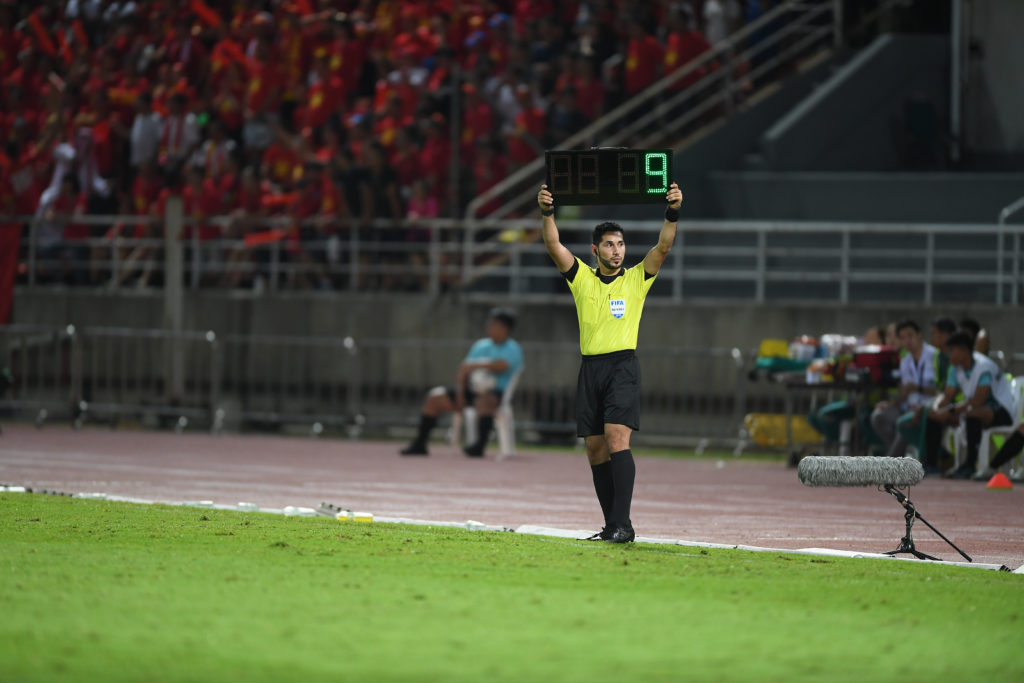The Art of Visualisation: What Visualising Success as a Referee Really Looks Like
It takes a lot of positivity and courage to believe in your refereeing dreams, but it doesn’t mean you shouldn’t be dreaming of promotions or appointments to key fixtures. When there is life, there is hope.
That is why it is important to get up and believe in your officiating dreams no matter what your circumstances are, but when we say to “believe” in the dreams we have for ourselves, we need to be able to use the right tools to practice it.
Just saying you believe in gaining promotion or being appointed to a key fixture is not enough. You have to act upon it. One of the actions you can do related to that involves visualising your success, and how that success is built.
Improve your Mental Health, by learning about, and trying visualisation in your pre-match routine.
What is Visualisation?
Visualisation is the art of mental imagery, where you put your focus entirely on achieving a dream and actualising it to become true.
So, when you say you believe in gaining promotion or being appointed to a key fixture and you are applying the art of visualisation for it, you are using your mind to portray your refereeing dreams already becoming true. So, while in the real world, nothing has changed, in your mind, you are already in the state of mind where you have conquered what you dreamed for.
So, Why is Visualisation Important?
The goal is to build a mindset, or more like, shift your pattern of thinking.
Your current mental state tells you that you haven’t achieved the promotion or the appointment to the key fixture. It makes you think that you are lacking, and it might create a sense of inability. This can result in a lack of motivation for some, or in worse cases, giving up on the whole purpose of your officiating dream.
Moreover, it does put distance between you and what you want in your life. Imagine this, you want to go to a particular university, but you have no idea what it looks like or what the campus life is going to be once you are in it, then it would be hard to consider how you envision yourself as a successful graduate of that institution.
That is why it is important to be able to use the eyes of your mind and get really deep when dreaming of a positive outcome. When you are in that mindset, you are better able to create a vision that works towards that. This accelerates the process of achieving your refereeing goals.
What are the Benefits of Visualisation?
The benefits of visualisation are truly embedded in their ability to shift your mindset for the better.
Visualisation can stop the stagnation you may be experiencing in your life and can drive that willpower needed to strive for success. As you visualise things, such as gaining promotion or being appointed to a key fixture, you can actually feel the emotions and your deepest values being fulfilled, which in turn fuels your internal motivation.
You cannot truly work towards your officiating goals if you are not able to picture them standing from the other side of the horizon and to look at things from another perspective. As you begin to visualise, you see things getting decluttered, distractions moving away from you, and positive energy flowing to you never like before.
You observe your life to be more aligned with your refereeing goals which will give you the fuel you need to make your dreams a reality.
Also, if you visualise simple things, such as being in a happy state, you will feel it is easier to achieve it when you program your mind to envision it first.
How Can I Do It?
Visualisation starts with a focus in mind.
As you are focusing on one clear thing in your mind, you are alerting your mind, repelling the negative thoughts while paving the way for positive ones.
Visualisation works on this basic principle,
“Begin with an end in mind.”
So, when you are truly picturing a goal, such as gaining promotion or being appointed to a key fixture, you are starting from the end, which is not the goal in itself but the reactions that come after it. By knowing the whole story from the last page, you begin working backwards.
You start by breaking it down into digestible pieces if the goal you are trying to achieve seems “too good to be true” for you.
So, instead of painting the whole picture in your head, start by working on one emotion: How happy will I feel if I attain this goal I have? Who will be the first person I would share this news with? How would it make them feel? How will they celebrate?
You see, you start making a story, and gradually you work towards creating a whole scenario that describes well your goal.
What Are Some Common Visualisation Techniques?
Some common visualisation techniques include:
Guided Meditation
This is one of the major meditation techniques you can practice. Generally, an instructor helps you paint a picture in your head and follow meditation techniques. As you begin to practice it in fluency, you find it easy to bring focus on what you want.
Lit Candle Exercise
Gaze into a lit candle and close your eyes. You would experience something called an after-burn effect in which you would be able to visualise its effects. Using this visualisation, you can mentally trace its shape that is present in front of you.
Apple Visualisation
It will help you visualize through interactions. Try feeling the smooth peel of an apple with your closed eyes. Observe the perfectly ripe sheen and visualize yourself taking one bite. Now imagine its taste as well. The crispiness and the sweetness should also be imagined as you happen to get better at it.
Final Visualisation Reflections
Visualisation, as you can see, is not restricted to meditation classes.
Whatever be your goal for refereeing, you have the ability in you to bring your officiating dreams to reality using the amazing power of your mind.
By just bringing more focus on the bigger picture, getting rid of distractions, having some discipline and routine, and diving into details of the imagery, you too can paint a powerful picture in your head. It will help you achieve the possibility of attaining a goal you have always dreamed of achieving, no matter how overwhelming or challenging it may seem.
At The Third Team I work individually and in collaboration with different professionals where I have developed workshops and 1-2-1 sessions associated with Resilience and Mental Toughness Development to help referees. The workshops and 1-2-1 sessions are interactive, where referees are encouraged to open up and share their experiences to help themselves and each other.
Feel free to contact me if you’d like to know more about my workshops or 1-2-1 sessions and how I could help you or your officials.
Best Wishes,

Nathan Sherratt
Referee Educator & Managing Director of The Third Team

Nathan Sherratt
Nathan Sherratt, Referee Educator, Resilience Trainer and Managing Director of The Third Team. A Mental Toughness Practitioner based in County Durham, North East England.

